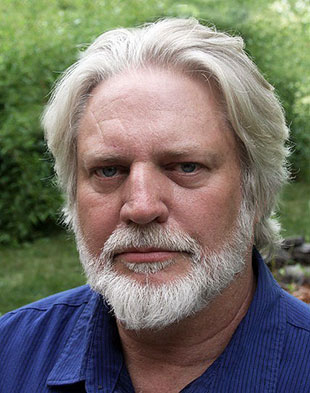Using the teachings of the sage as a luminous mirror,
in which to see one’s own mind reflected.
Using one’s own mind as a lamp of wisdom,
with which to illumine the profound meaning of the teachings.
–Zongmi
History
Siddhartha Gotama Buddha lived in India about 480-400 BCE, making him almost exactly contemporary with Socrates. Siddhartha the prince became Gotama the wanderer after leaving home and 'going forth' into a contemplative lifestyle at age 29, and then became the Buddha after 'waking up' by gaining wisdom under the Bodhi tree at age 36 . For the remaining 45 years of his life he wandered across the Ganges valley of north India, sharing and explaining what was known as 'dharma-vinaya', an integrated program of conceptual and experiential knowledge.
The dharma is conveyed in a large body of texts, preserved in the Pali language of ancient India, that were composed (orally) by the historical Buddha and his first generations of followers. They contain detailed explanations, based on empirical observation and investigation, of how the human mind and body operate from moment to moment to create either suffering or well-being, depending on one's level of understanding and skill.
The vinaya refers to a set of instructions for actually putting this knowledge into practice in one's own life. An early sense of this word covered broad ethical guidelines, meditation practices, and other lifestyle parameters, which evolved into a well-developed set of rules for early Buddhist monastic life. In the Buddha's time all teachings were put into practice, and all practices were guided by a set of teachings.
Integrating Ways of Knowing
This integration of theory and practice is not natural to the Western civilization now assimilating these Buddhist teachings. The dharma has come to the West through two different paths that have remained for the most part separated from one another:
- The academic study of Buddhism in departments of comparative religion, which emphasizes textual and linguistic studies, historical data, and interpretive theory, but which discourages engagement with traditional practices (such as meditation) because doing so may compromise academic objectivity.
- The practice of meditation as introduced by various religious communities and traditional lineage-holders or their students, primarily from Japan, Korea, Tibet, and Southeast Asia, which encourage many customary practices and beliefs, but which either do not engage in the study of the historical Buddha's teachings or generally undervalue conceptual knowledge.
The Integrated Dharma Institute is dedicated to revitalizing the natural relationship between the study and the practice of the dharma.
It provides students of all levels of interest and experience an opportunity to look closely for themselves at the classical teachings of the historical Buddha, and provides tools to help understand what the texts are saying and why they are translated as they are. In addition, it provides guidance for investigating the meaning of these teachings in one's own lived experience, and for putting these wise teachings into practice in one's own live.
Biography | Andrew Olendzki
Andrew Olendzki first encountered Buddhist thought as an undergraduate studying philosophy and religious studies in Boulder, Colorado, and immediately went into the mountains alone to sit down and try out this thing called meditation. Ever since, the academic study of Buddhist teachings and the experiential investigation of their meaning through meditation have gone hand-in-hand, each informing and guiding the other.
Andrew worked as a carpenter and cabinetmaker for many years as he pursued his higher education, integrating an intellectual life with developing the practical skills of a craftsman.
After a year in India and Sri Lanka, and several years studying Sanskrit and Pali at Harvard, he earned a Ph.D. from Lancaster University in the UK. His primary mentors were Ninian Smart at Lancaster, Mas Nagatomi at Harvard, and Lilly deSilva in Sri Lanka. His doctoral dissertation developed a new psychological perspective on the core Buddhist doctrine of interdependent origination, showing how it can be used to understand the origination and cessation of one's own moment-to-moment experience. Viewed in this way, it becomes a powerful tool for psychological transformation.
After several years as an assistant professor at Montserrat College of Art and teaching at other colleges, he was asked by Joseph Goldstein to become the first executive director at the Insight Meditation Society in Barre, Massachusetts (where he had been teaching Pali to the IMS meditation teachers). He thus left the academic world to play a leadership role in the meditation community, largely because of his passion for grounding the teachings and putting them into practice.
The Work
Andrew was interested in helping to forge a new paradigm, the integration of study and practice, which drew upon both intellectual and experiential approaches to Buddhist studies.
This was the core mission of the Barre Center for Buddhist Studies, which Andrew helped establish next door to IMS and ran for twenty five years as its executive director and senior scholar.
By looking closely at the original teachings of the historical Buddha, and carefully crafting an array of different courses and programs in which these teachings are investigated using meditative skills, a new way of engaging in Buddhist studies was created, along with a way of practicing that was closely aligned with the original teachings of the Buddha.
All this culminates with the creation of the Integrated Dharma Institute, an organization that provides online access to a wide range of integrated study and practice materials.
It is a way of bringing this valuable work beyond one classroom, or one meditation hall, to reach people all over the world who have a sincere interest in understanding for themselves what the Buddha was teaching.
These teachings are profoundly valuable, with the ability to help individuals find happiness and meaning in their own lives, and to help us all make a healthier world by supporting the well-being of everyone.
 Andrew Olendzki
Andrew Olendzki